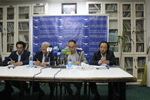Egyptian NGOs launch campaign to monitor new government’s first 100 days
Published on Thu, 2012-07-05 09:11
Seventeen human rights non governmental organizations launched on Wednesday officially launched their “Human Rights in 100 Days” campaign to pressure new Egyptian President Mohamed Morsi to follow through on rights of Egyptian citizens. The newly created Forum of Independent Egyptian Human Rights Organizations, which includes the Egyptian Association for Community Participation Enhancement (national focal point of Social Watch), had sent a letter to President Morsi on Monday “delineating the most important steps which must be taken to improve Egypt’s human rights condition and which they believed were missing from the President’s strategies and statements,” reported Bikya Masr news portal. Wednesday’s meeting was attended by civic leaders such as Bahey eldin Hassan, Director of the Cairo Institute for Human Rights Studies; Magdy Abdel Hamid, President of the Egyptian Association for Community Participation Enhancement; Emad Mubarak, Director of the Association for Freedom of Thought and Expression; and Gasser Abdel-Razek, Associate Director of the Egyptian Initiative for Personal Rights. The groups will monitor human rights and the president’s commitment during his first 100 days in office. “Based on the critical role of civil society in defining and shaping the political future of the country, the form of independent Egyptian human rights organization launched a campaign entitled ‘Our Rights in 100 Days’ to evaluate the performance of the president-elect during his first 100 days in office,” said the statement. The goal is to create accountability for the new president as he begins to form a new government, which observers say remains up in the air and unlikely to be finalized this week. “The 7-page memo began with the observation that the 100-day plan which was promised by the president does not sufficiently address the critical nature of the challenges currently facing Egypt, especially in the realm of human rights. Indeed, the plan neglects human rights issues and fails to present practical solutions to the grave crises which have been created by the transitional period under the rule of the Supreme Council of the Armed Forces (SCAF), with the participation of the now-dissolved People’s Assembly,” said the statement. The groups called on Morsi to issue a series of decrees that would guarantee the rights of Egyptian citizens and also demanded that he work to release all political prisoners jailed by the military junta since the end of the uprising on February 11, 2011 that ousted dictator Hosni Mubarak, added Bikya Masr. The press conference held on Wednesday was the first of several activities organized under the “Our Rights in 100 Days”. The campaign’s primary objective is to monitor the President’s commitment to human rights in the first 100 days after his election and it will include conferences, lectures, press-releases and other activities which will be announced accordingly, reported the Cairo Institute for Human Rights Studies in its web site. “The undersigned rights organizations congratulate the Egyptian people on the inauguration of the first elected civilian president in Egypt’s history, following competitive elections that were deemed to be fair overall despite the challenges raised,” reads the statement. “While we congratulate Dr. Mohammed Morsy, the candidate of the Muslim Brotherhood and its Freedom and Justice Party, on his presidential victory, we stress that the president must adopt an ambitious program that responds to Egyptians’ aspirations and the enormous sacrifices they have made over the decades for the sake of freedom, social justice, and human dignity.” “He must seriously address Egypt’s legacy of human rights crimes, which did not cease with the ouster of Mubarak and some members of his regime. He must also deal with the challenges created by the mismanagement of the country’s affairs during the transitional period, including the supplementary constitutional declaration introduced by SCAF in the run-up to the announcement of election results in which SCAF established itself as the guardian of the process of drafting the new constitution, reclaimed legislative authority, and effectively turned the military establishment into a state within a state by granting it autonomous decision-making powers not subject to accountability. This is the result of the SCAF’s misguided roadmap from the beginning, the latest development of which is the election of a president without clear prerogatives and authorities,” adds the document. The signatories of the memorandum are the Cairo Institute for Human Rights Studies, the Andalus Institute for Tolerance and Anti-Violence Studies, Appropriate Communications Techniques for Development, the Arab Penal Reform Organization, the Association for Freedom of Thought and Expression, the Center for Egyptian Women’s Legal Assistance, the Egyptian Association for Community Participation Enhancement (EACPE), the Egyptian Center for Economic and Social Rights, the Egyptian Initiative for Personal Rights, Egyptians Against Religious Discrimination, the Group for Human Rights Legal Assistance, Hesham Mubarak Law Center, Nazra for Feminist Studies, New Woman Foundation, the Arabic Network for Human Rights Information, the Egyptian Foundation for the Advancement of Childhood Conditions and the Human Rights Association for the Assistance of the Prisoners. Sources
|
SUSCRIBE TO OUR NEWSLETTER



